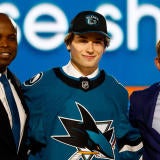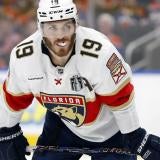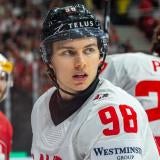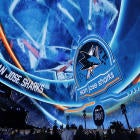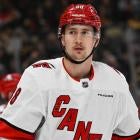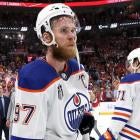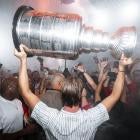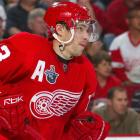The Dallas Stars ended up getting what had to be one of the best bargains -- and biggest surprises -- in free agency last summer when they signed veteran forward Michael Ryder to a two-year, $7 million contract.
For Ryder, the deal ended up being a $500,000 year paycut from his previous deal with Boston, and he went on to score more goals (35) than any other player that signed during that free agency period last summer (technically he was tied for that lead with Erik Cole, who also scored 35 goals after signing a four-year, $18 million contract with Montreal, but Ryder did it for $1 million fewer against the salary cap. Advantage: Dallas).
Even though Ryder had twice topped the 30-goal plateau in his career I don't know that anybody outside of Dallas expected that sort of production from him last season, especially since that total matched what he had produced over the previous two seasons ... combined.
Ryder is returning to Dallas this upcoming season for the final year of his contract as part of a revamped Stars lineup. Their top lines will feature returning young stars like Loui Eriksson and Jamie Benn, as well as the offseason additions of Derek Roy (once he returns from his offseason surgery) and seemingly ageless veterans Ray Whitney and Jaromir Jagr. It will certainly be an interesting group to watch.
But what should be a realistic expectation for Ryder coming off what was a career-year almost entirely across the board?
A couple of things to consider:
1) He's probably not going to score on 16 percent of his shots again
Along with a career-high in goals, Ryder also set a new personal best with a 16.6 percent shooting percentage on his 211 shots.
That's a high number, and not only significantly higher than his career average, but quite a bit higher than what is now the second best mark (14.6) of his career. Ryder has always had a really good, quick, powerful shot, but it's not that good. At least not good enough that he'll consistently be able to convert on that many of his attempts, and it should be expected that number will come down this season.
Let's look at it another way: between the 2002-03 and 2010-11 seasons there were only 35 players in the NHL that finished a season with at least 200 shots on goal and a 16 percent shooting percentage.
Of those 35 players only five of them came back the next season with an increase in their shooting percentage. Those players were:
- Steven Stamkos -- went from 16.5 in '10-11 to 19.8 the following year
- Sidney Crosby -- went from 17.1 in '09-10 to 19.9 the following year
- Dany Heatley -- went from 16.1 in '06-07 to 18.3 the following year
- Martin St. Louis -- went from 16.4 to 17.9 the following year
- Alex Burrows -- went from 16.7 in '09-10 to 17.1 the following year
And that's it.
The other 30 players that fit that criteria all saw a drop the following season -- and in many cases a significant one -- in their shooting percentage. So the odds of him improving on that number, or even maintaining it, are not on his side. The average drop was right around 3.3 percent. Such a decrease would put Ryder's shooting percentage this season at 13.3, which isn't that far off from his career average. Which is probably what we should expect him to shoot.
A lot of things went right for Ryder last season in the goal-scoring department. A lot of the bounces seemed to go his way, and he seemed to score a ton of goals on deflections and rebounds while crashing around the net. And there's nothing wrong with that. But sometimes the puck doesn't bounce your way.
Another easy to overlook number: He also had an opportunity to score a ton of empty-net goals last season. Four of them, to be exact. Only one other player in the NHL scored more last season (Milan Michalek with five) while no other player on the Stars scored more than one.
There's a lot to be said for having the trust of your coach to be on the ice in an empty-net situation when you're protecting a one or two goal lead late in the game, but to score that many goals in such a situation just seems like one of those things that has a lot of luck and randomness to it. Keep in mind that before last season Ryder, in a career that featured over 550 games and 160 goals at the NHL level, had never scored a single empty-net goal.Not one.
2) Will the loss of Mike Ribeiro have any impact?
Probably not a huge one, but it's at least worth considering.
Ryder spent most of his time on the ice last season playing alongside Mike Ribeiro and Loui Eirksson. Ribeiro, of course, is no longer with the team after being traded on draft night to the Washington Capitals for Cody Eakin and a second-round draft pick.
Now, as I mentioned above, even without Ribiero the Stars are still going to have plenty of talent in their top two-lines so it's hard to see how much -- if any -- impact the loss of Ribeiro will have. And while Ryder saw a lot of time on a line with Ribeiro and Eriksson last season, he also saw a lot of time with Benn and Eriksson, and that's not exactly a bad line to be a part of either. And I suspect he could see plenty of time with those two guys again given the success they had.
In fact, the always underrated Eriksson had a hand in more of Ryder's goals (20) than any other player on the team. But it's still worth pointing out that Ribeiro assisted on 12 of them, and of the 64 goals Ryder was on the ice for during 5-on-5 play, he was on the ice with Ribeiro for over 40 percent of them.
I don't know that it's going to make that much of a difference, but the duo did have quite a bit of success together.
Ryder should still be a very productive player for Dallas, and at a pretty reasonable price against the salary cap. But a lot of things went right for Ryder last year and "puck luck" seemed to be on his side more often than not. I think whatever expected decline in his shooting percentage takes place will have a bigger impact on him than his linemates, and if he's able to get around 200 shots on goal again but only shoots at 13 percent instead of 16 percent that would put him somewhere in the area of 26.5 goals next season.
So let's go with that number and ask a simple question...
Michael Ryder in 2012-13: over or under 26.5 goals?
For more hockey news, rumors and analysis, follow @EyeOnHockey and @agretz on Twitter and like us on Facebook.



